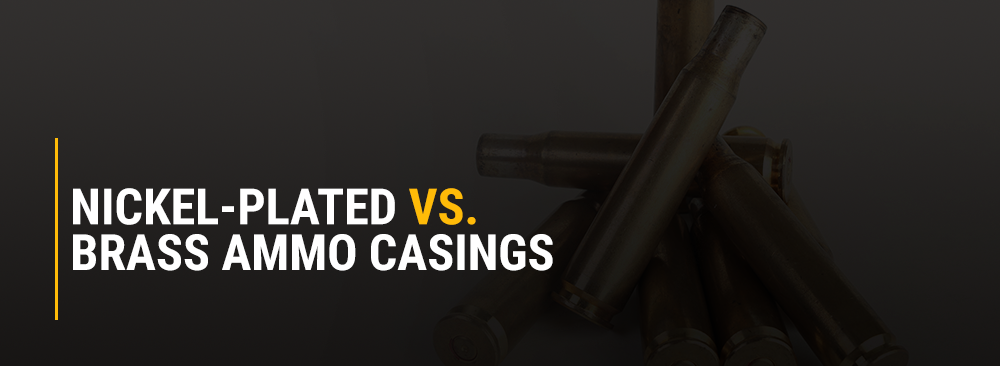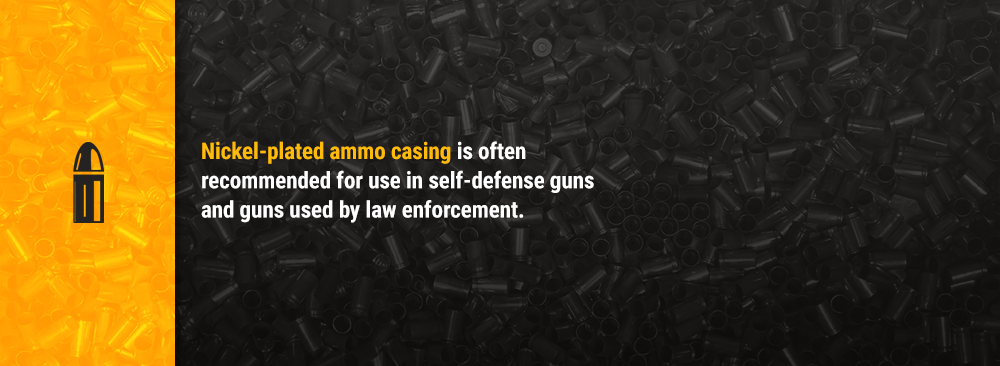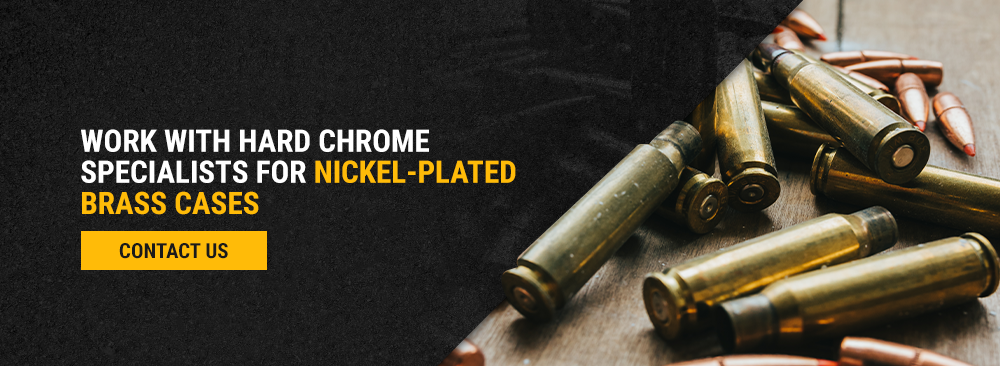Nickel-Plated vs. Brass Ammo Casings

If you hunt or shoot at a range, one question you might have found yourself facing is whether to use brass ammo casings or try out nickel cases. Although brass has been used for centuries as ammunition casing, in recent years, the ammo manufacturers have begun to offer nickel-plated options, too. Nickel-plated ammo doesn’t eliminate the brass material. Instead, the nickel coats the brass.
Each option has its benefits and potential drawbacks. In many cases, whether brass or nickel-plated brass is the right choice comes down to personal preference.
Anatomy of a Cartridge
Before weighing the pros and cons of nickel-plated or brass ammo casings, it helps to understand how cartridges are put together. A cartridge typically consists of four parts:
- Primer: The primer is a small circular object at the base of the cartridge. It’s filled with a chemical that explodes when the gun’s firing pin strikes the primer. The explosion produces a flame that travels through the casing, igniting the powder.
- Case: The case or casing of a cartridge is the container that holds the primer, the gunpowder and the bullet. Casings are traditionally made from metal, such as brass, aluminum or steel. New options are made from lighter-weight materials, such as polymers (plastics). After you fire a gun, the case drops out of it, or it is removed by the person handling the weapon.
- Powder: Gunpowder, or propellant, is a rapidly-burning material located inside of the cartridge casing. Powder burns so quickly that it can seem as if it is exploding. It’s not. It’s merely igniting rapidly. The ignition of the gunpowder produces a gas that increases the pressure inside of a cartridge.
- Bullet: The bullet is a projectile located at the tip of the ammo cartridge. It’s the part of the ammo that actually leaves the gun after firing. The buildup of gas pressure inside of the cartridge due to the ignited gunpowder pushes the bullet forward. Some bullets are made of lead and others of copper. It’s also possible for a bullet to have a lead core surrounded by a copper coating.
You can reuse the casing of a cartridge, provided you clean and prepare the casings first.
Benefits of Nickel-Plated Casings
If you’re in the market for more ammo, you might be considering nickel-plated brass cases, or you might want to add nickel-plating to existing brass ammo cases. There are a few benefits of choosing nickel-plated casings:
- Corrosion resistance: A common complaint people have about brass cases is that over time, the metal starts to corrode, producing green spots called verdigris. Applying a nickel coating to the brass stops corrosion, as the nickel barrier completely envelops the brass.
- Easy loading: Both nickel or brass cases make for easy reloading, but nickel-plated brass has a lower coefficient of friction than just brass. This means the cartridges with nickel-plated casing slide into a gun better. The low coefficient of friction also allows for smoother and easier extraction of nickel-plated cases. Nickel-plated cases are less likely to jam or get stuck in the weapon.
- Easy to see: The color of nickel-plated casings can make them easier to see, both when firing a gun and when inspecting the chamber of a gun to see if it is loaded or not.
- Improved strength: Adding a layer of nickel to a brass case can strengthen the case’s material, making it last longer.
Although there are many benefits to choosing nickel-plated casings, there are some potential drawbacks to consider. Nickel-plated brass cases have a higher per-case price than brass cases or cases made from steel or aluminum. Depending on the plating quality, there is also a potential for the nickel to flake off the casing. Choosing a process, such as electroless nickel plating on brass, that produces a smooth and durable coating will ensure the quality of nickel-plated brass cases.

When to Choose Nickel-Plated Ammo Casings
Nickel-plated ammo casing is often recommended for use in self-defense guns and guns used by law enforcement. Because the cases have a higher corrosion resistance compared to brass cases, they are better suited for use in leather holders. The brass casing can stain the leather, creating unsightly marks. Also, since the nickel-plating is easy to see in dark or low-light conditions, it’s easier to confirm that a gun is loaded at the appropriate moment.
Benefits of Brass Casings
Brass ammo casings have been around since the mid-19th century. They are the casing of choice for many, especially when compared to aluminum or steel casings. Some of the advantages of using brass casings include:
- Reuse: You can refill and reuse brass casings repeatedly, unlike aluminum casings, which are single-use only. Reusing brass casings helps to cut down on the cost of your ammo considerably.
- Soft metal has a lower failure rate: Brass is a relatively soft metal, which works in its favor when used as a casing. It’s easy to spot an issue with a brass case because of the softness of the metal. You can clearly see if it’s deformed or misshapen. Should you notice that the case is misshapen, you’re likely not to use it, which can help extend your firearm’s life and prevent any issues with firing from happening.
- Doesn’t scratch: Another benefit of the softness of brass is that it’s less likely to scratch your firearm or otherwise mar or damage it.
The softness of brass does have a downside, though. It can mean that brass cases are more likely to be deformed than harder steel or nickel-plated brass. You could end up with a bad batch of cases, depending on the manufacturer you purchase from.
Another drawback of brass casings compared to steel or aluminum is the price. Brass is less expensive than nickel-plated brass but notably more expensive than steel or aluminum.
When to Choose Brass Ammo Casings
If you regularly shoot at a gun range, you might find that you need to use brass range ammo. Range owners often prefer brass casings for the simple fact that they can pick them up at the end of the day and reuse them, saving the range money and allowing it to earn revenue by re-selling ammo made from used cases.
Work With Hard Chrome Specialists for Nickel-Plated Brass Cases
If you have brass cases that you want to make more durable or if you are concerned about corrosion or the staining caused by corroded brass, nickel-plating the cases can be the way to go. Hard Chrome Specialists is an ISO-certified business that offers quick turnaround for plating on brass. To learn more about the benefits of nickel-plating on brass ammo cases and request a quote, contact us today.

